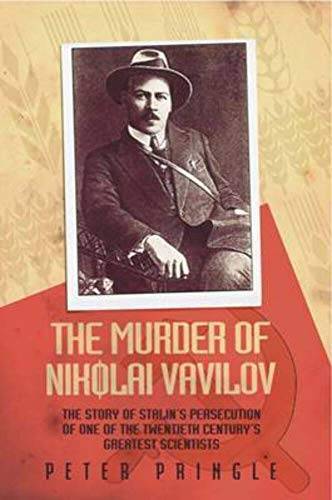
The Murder of Nikolai Vavilov: The Story of Stalin's Persecution of One of the Great Scientists
Check my rate
| Main centres: | 1-3 business days |
| Regional areas: | 3-4 business days |
| Remote areas: | 3-5 business days |

| Main centres: | 1-3 business days |
| Regional areas: | 3-4 business days |
| Remote areas: | 3-5 business days |
Published by Jr Books Ltd, 2009, hardcover, illustrated, index, 370 pages, condition> new.
Peter Pringle, journalist and author, New York, discussed the life of Nikolai Vavilov, an internationally recognized geneticist of the early twentieth century who, among his many accomplishments, established the largest seed bank in the world. Pringle was joined by Yuri Vavilov, the son of Nikolai Vavilov and himself a leading physicist at the Lebedev Physical Institute in Moscow.
According to Pringle, Nikolai Vavilov's motto was "Life is short. We must hurry," and he lived this maxim to the fullest. Pringle described Vavilov's education and early post-graduate training. Vavilov spent the Russian Civil War years at Saratov University, where he worked on plant breeding. He returned to Petrograd in 1920, and soon thereafter Lenin appointed Vavilov to deal with the 1921 Famine. As part of this assignment, Vavilov went to the United States in 1921 to learn more about U.S. agriculture and later returned to the Soviet Union with some 61 boxes of seeds. Vavilov ultimately travelled to five continents over the next ten years to identify gaps in botanical record for cultivated plants, especially wheat, and collect seeds for his seed bank.
In 1929, the Soviet secret services opened a file on Vavilov, accusing him of mixing with White Russians abroad. Despite his precarious position, however, Vavilov strongly believed in state-sponsored science over private science, arguing that science could be more effective with a centralized command. As a result, Vavilov tried to persuade key Russian scientists to return to the Soviet Union. In 1932, Vavilov travelled abroad for the last time, and before leaving, he sensed that this would be his last major foreign expedition. In 1933, Vavilov began to clash with Nikolai Lysenko, who ultimately plotted Vavilov's downfall. Vavilov's last expedition was to Ukraine in 1940, where he went to search for various types of wheat. While on this expedition, the NKVD arrested Vavilov, and he was never seen in public again. Vavilov's contribution to science, however, was not forgotten. Vavilov ultimately was rehabilitated and, in 1987, a celebration occurred to mark the centenary of his birth.